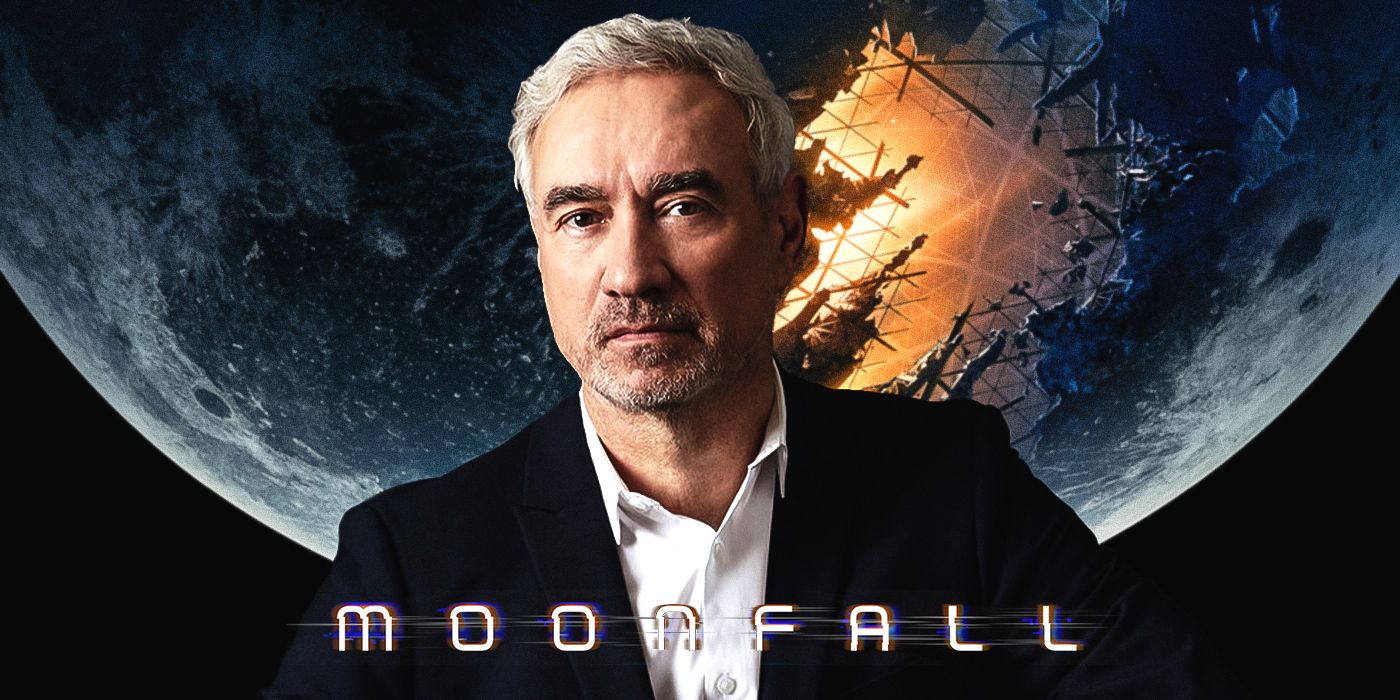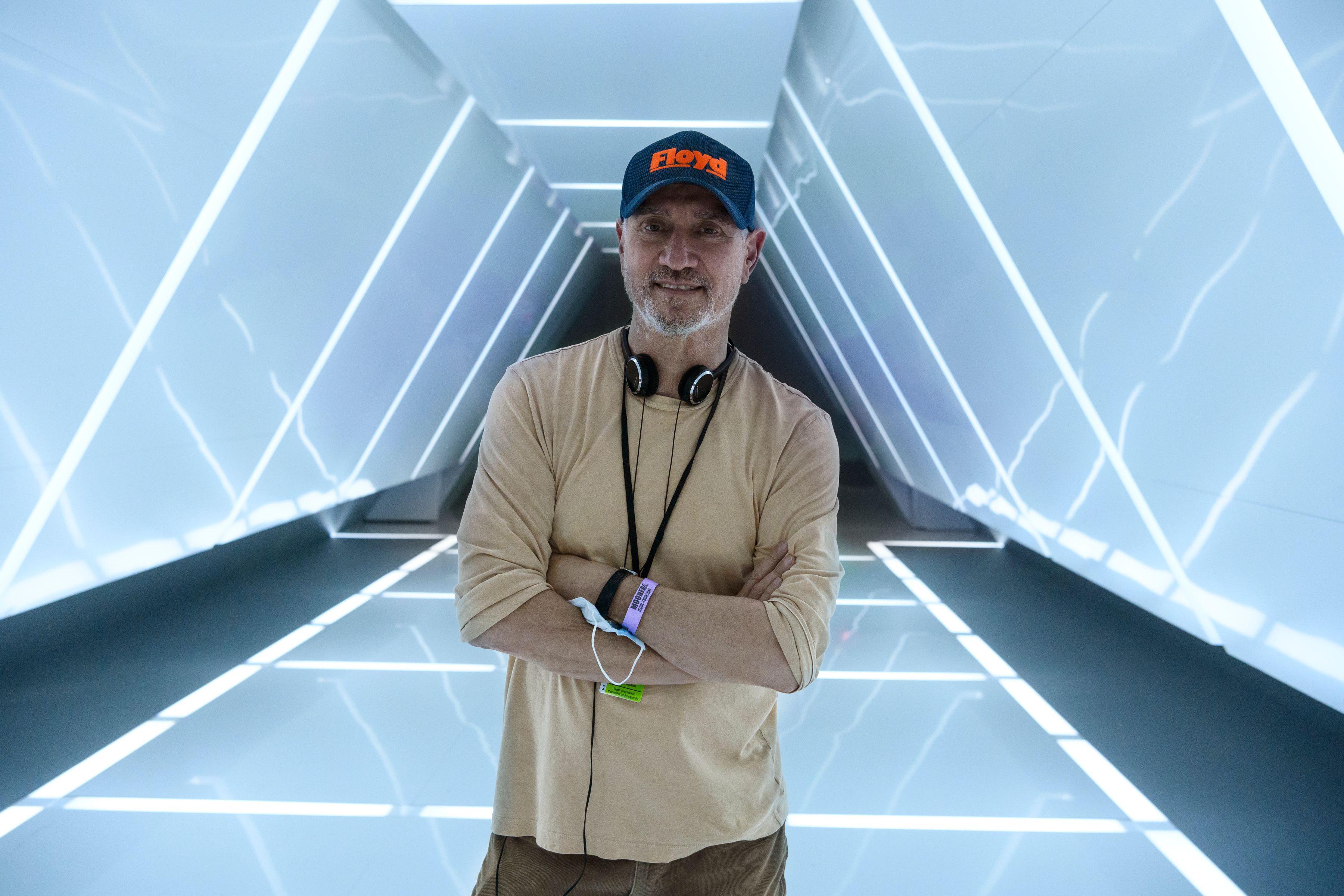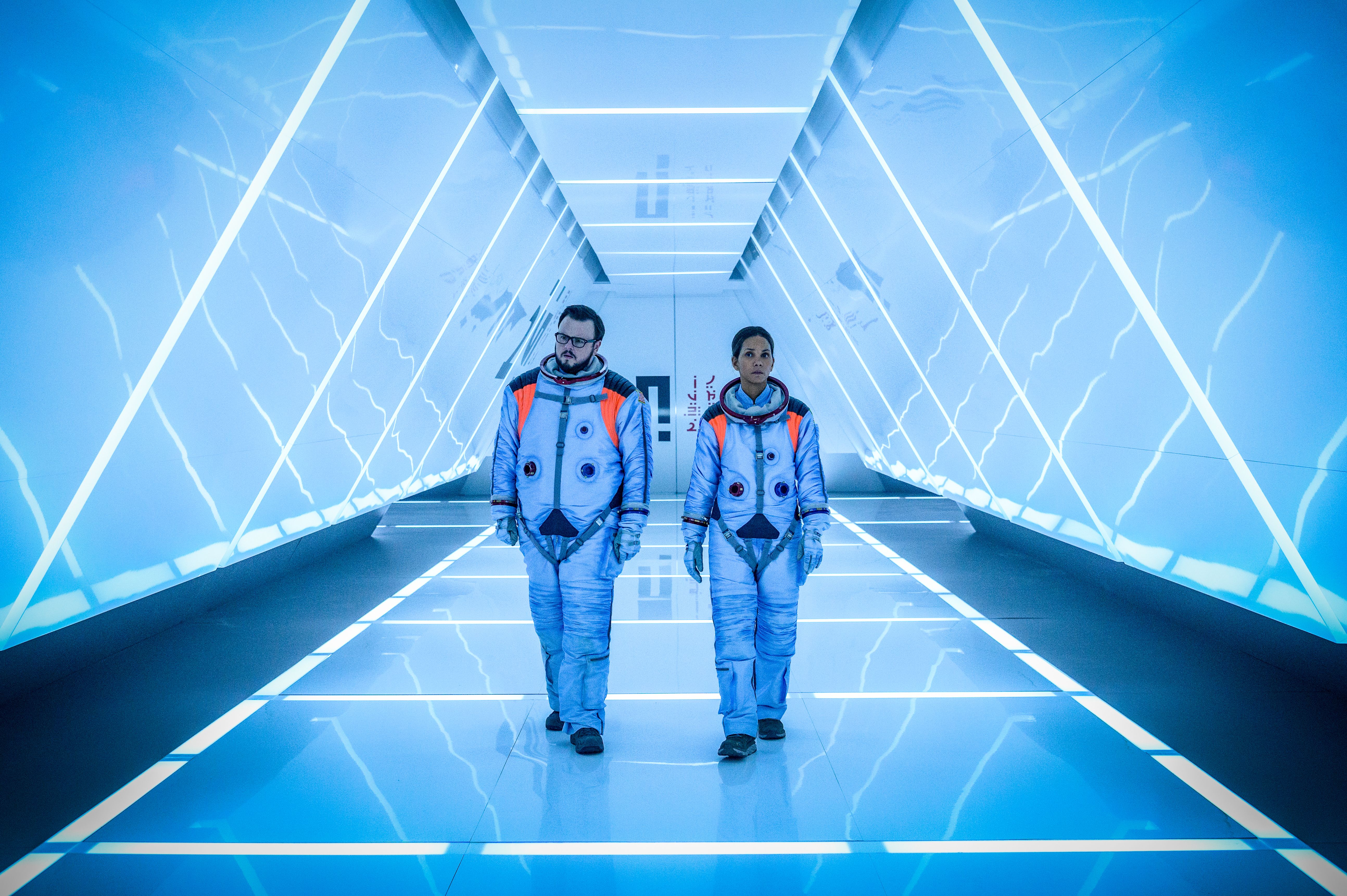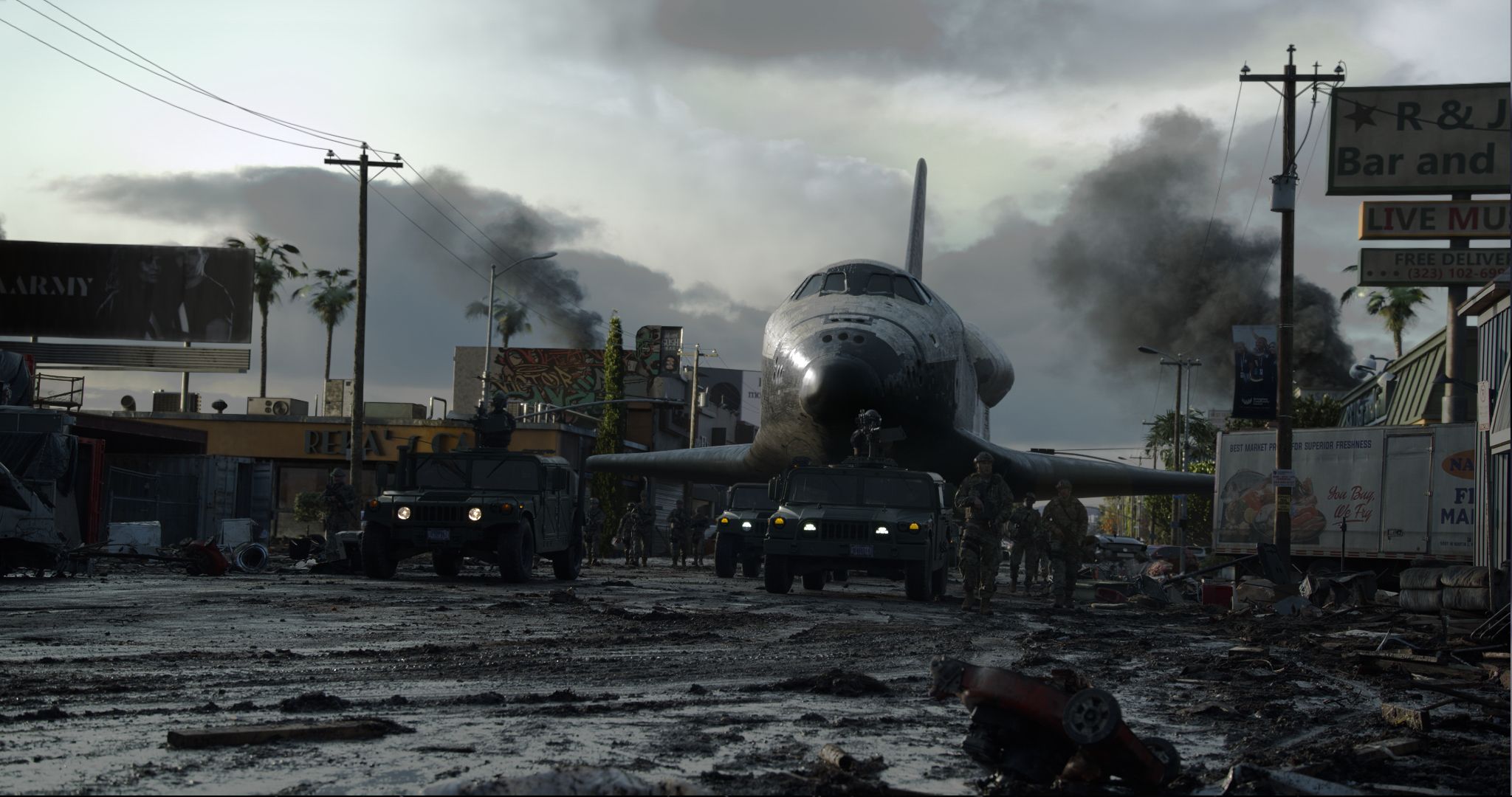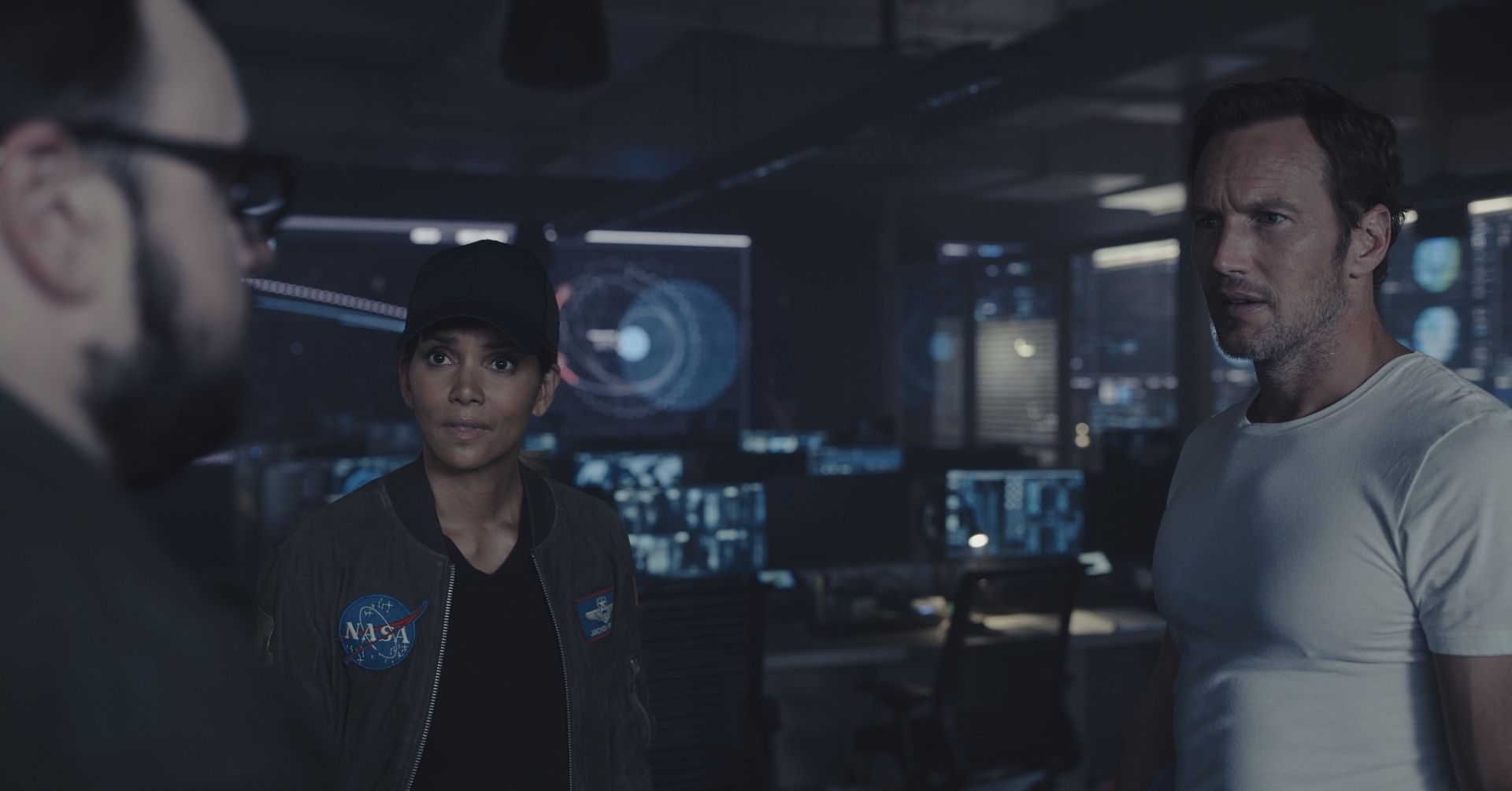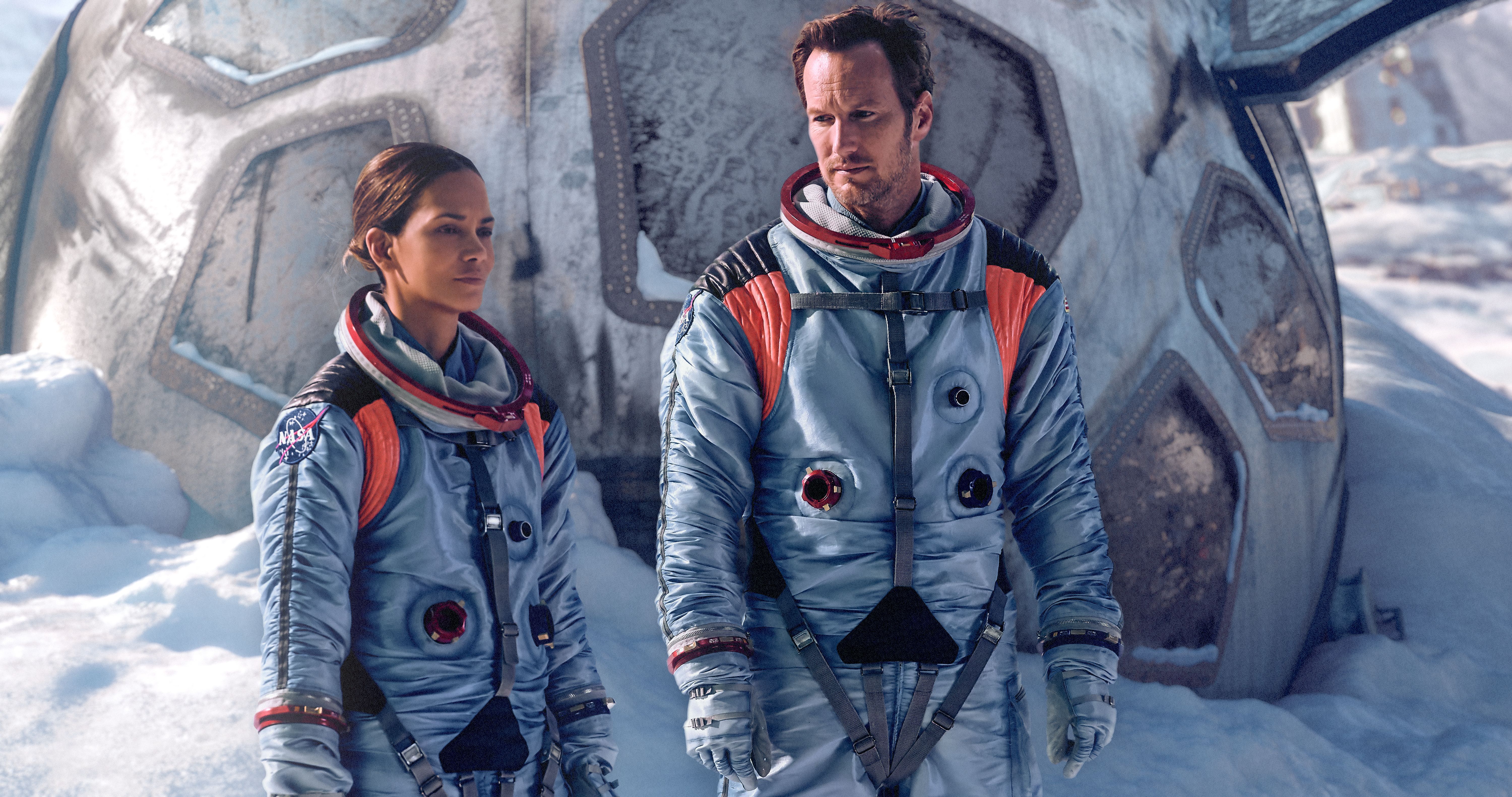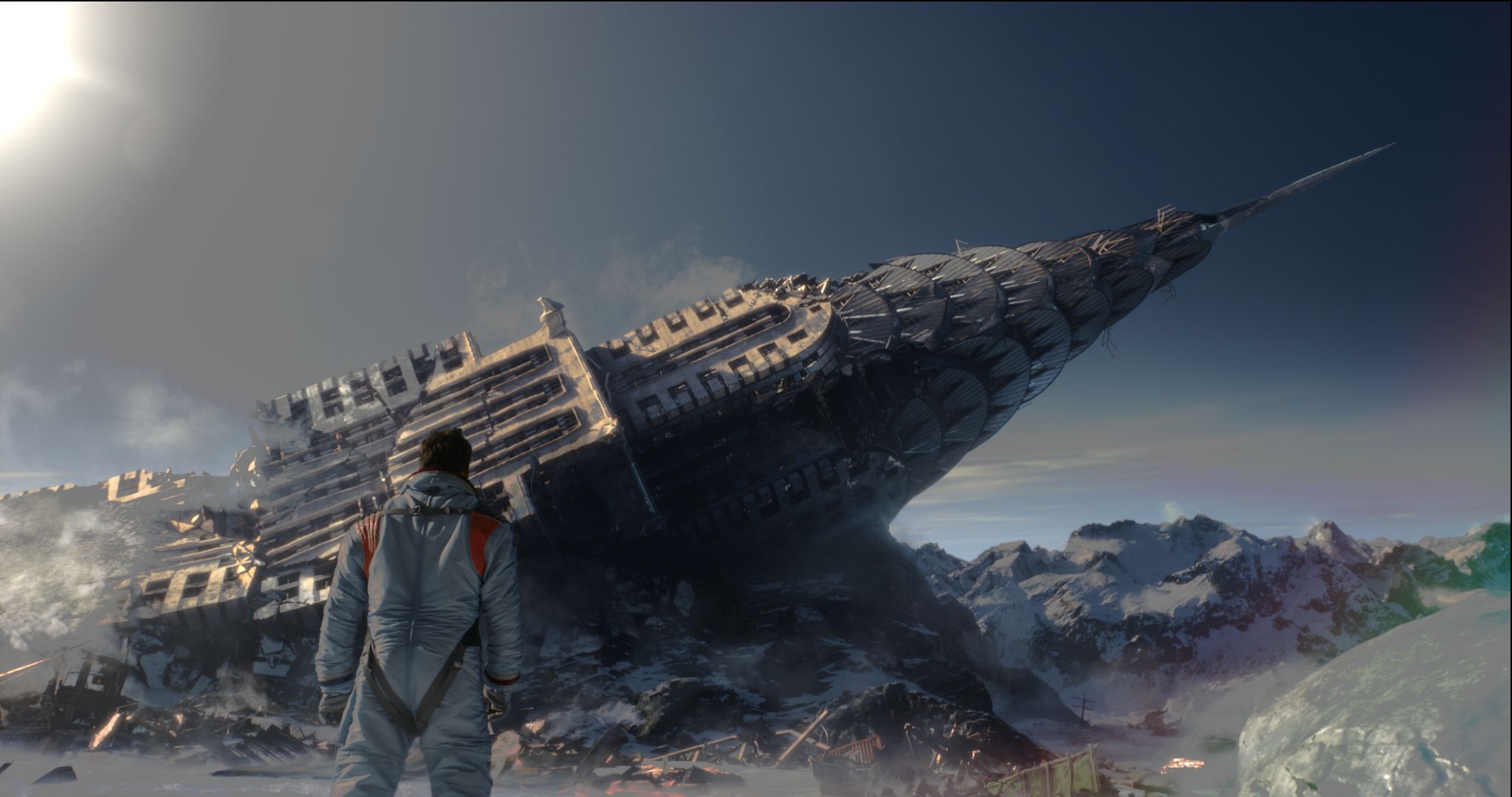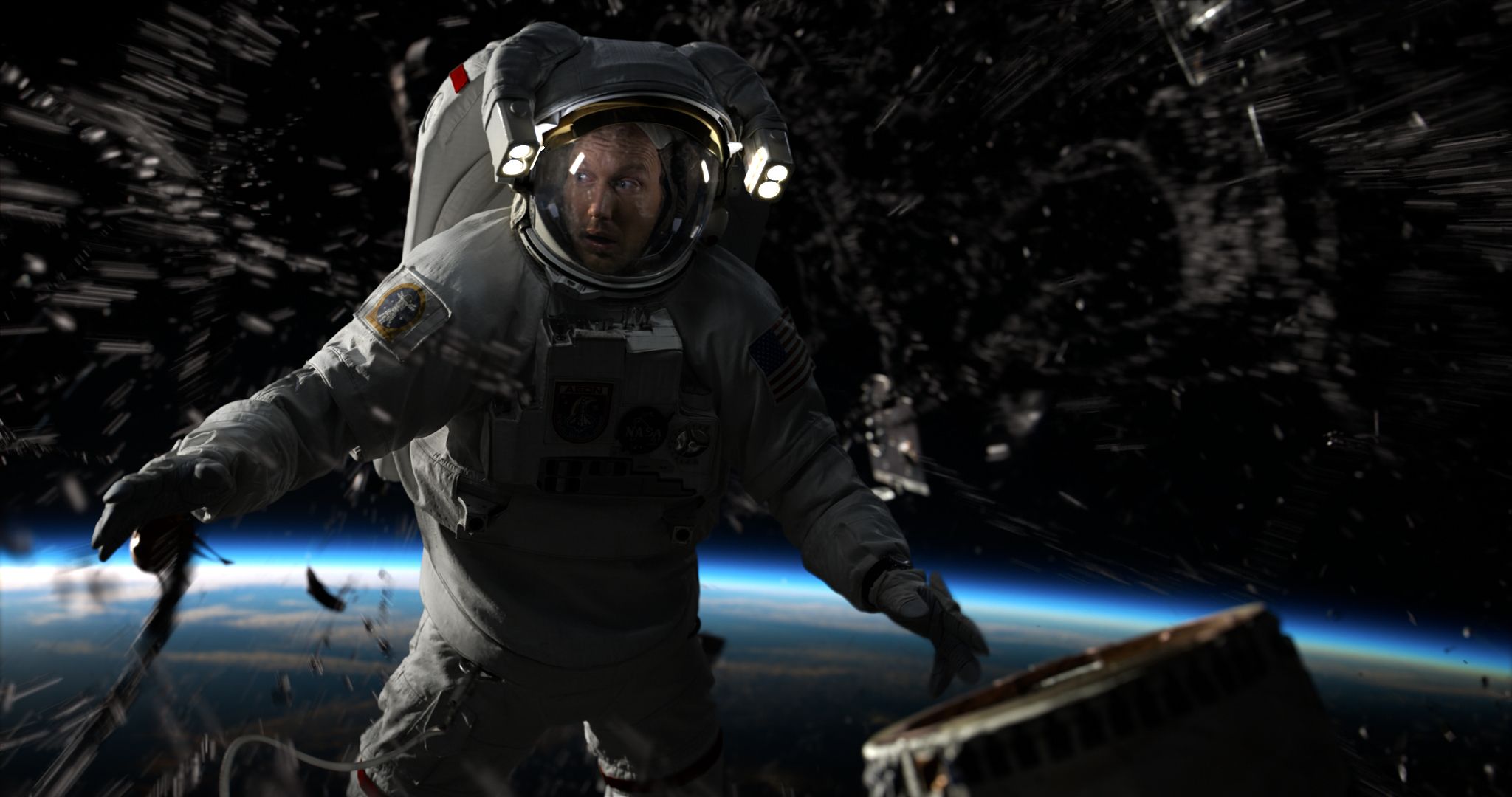With Moonfall arriving in theaters on February 4, last month I got to visit the Los Angeles editing room to watch a few scenes with director Roland Emmerich and then talk with him about making the film. If you haven’t seen the trailer, or the first five minutes of the movie, Moonfall tells the story of an unlikely team of individuals (Halle Berry, John Bradley, and Patrick Wilson) who are tasked with saving the Earth when the moon is knocked off its orbit by a mysterious force and comes hurtling towards earth. Moonfall also stars Michael Peña, Donald Sutherland, Kelly Yu, Eme Ikwuakor, Carolina Bartczak, and Charlie Plummer. The script was written by Emmerich, Harald Kloser, and Spenser Cohen.
During the interview, Emmerich talked about why he wanted to make this movie, how the film imagines that someone built the moon, how the nano swarm (which you see in the trailers) are the bad guys, why he was surprised that NASA agreed to be part of the film, what changes he made after test screenings, the way Bradley’s character adds levity, how the script changed along the development process, and more. In addition, we also talked about Game of Thrones’ final season, and we both agreed it wasn’t good.
Finally, Emmerich revealed that he originally envisioned Moonfall as a trilogy, how he’s not sure if he still wants to make sequels, but if he does make Moonfall 2 and 3, he’d shoot them back-to-back with the second one ending on a cliffhanger. He said:
“I'm also not very high on sequels. But I tried this time to make this a trilogy, but I am not sure even if I want it anymore. I think if I do a sequel, I will make it a little bit more like the original Star Wars, the second one will have a huge cliffhanger. Because that's totally lost on people. Everything always has to be clean cut. Why not leave them hanging and say, we left you hanging see the conclusion, in two years.”
Check out my conversation with Roland Emmerich below, and look for more Moonfall interviews closer to release.
COLLIDER: Jumping into Moonfall, one of the things that's interesting about the footage that you showed me, is the way you use VFX to help tell your story. Can you talk about what technology has been able to do on this film… is it easier now than it has been in the past, or is it always a huge challenge?
ROLAND EMMERICH: It's always a huge challenge, and it's a slow process, and it will stay a slow process. I don't think they will ever make VFX movies fast. It's just a very slow process. And it took like nearly 11 and a half months now, to get it where it's... we still have 150-200 shots to go.
What was it about this story that said I want to spend two years or more on it?
EMMERICH: Well, it was just the idea that the moon is not what you think it is. That somebody must have built it. Which is crazy and amazing, right? Then you learn who built it, which I cannot give away. But alone that somebody kind of put something like out there and there's kind of, let's say the bad guy, which is this nano swarm, who finally found us and that's how the whole movie starts. And that disables the moon and then the thing is falling. And if they don't kill this thing, then that's it. In this movie, there is not so much, I would say, Earth action than you normally find in my movies. It's a space movie, and to a lesser degree, that the moon is falling on Earth.
One of the things that is in the footage is, it's clear conspiracy theories play a role in the movie. It is also interesting that on our planet right now, conspiracy theories are running rampant. You couldn't have known, maybe there was a little bit of your subconscious playing into all the conspiracies.
EMMERICH: Well, I do this traditionally. I always used conspiracy theories because, not that I really believe in them in any way, it's more like it's kind of the lure of it. That it's on the internet, you can check it out on the internet, et cetera. There is like endless stuff about the moon. So, in that respect, it was so strange for me that we got supported by NASA. I have no clue why they're doing this. Honest to God. I have no inkling of an idea why they did this, but obviously they need it.
We could access endless footage they have as images, which was great for us, I mean, because the real thing makes every shot more real. At one point, someone says, "So the moon is like the biggest cover-up in history.” And then Donald Sutherland says, "Yeah, you could say that." But it's always about conspiracy. My movies are very, kind of in a weird way similar. I don't know why that is. It's just what I like.
You're very good at destroying the planet. I am curious with Moonfall, when you're on set or you're in the editing room, what ended up being the things that you regret writing because it was challenging to get right?
EMMERICH: I have to say to kind of shoot the movie was a relatively fast affair because we had to do it in 61 days.
That is very fast.
EMMERICH: I have no second unit or anything. I only have a splinter unit, and I directed both. I have to say it was pretty straightforward. The biggest problem was figuring out how to do the nano swarm. That was probably the biggest problem. We labored on that endlessly.
How did you end up deciding on what it finally looks like?
EMMERICH: It couldn't look too technical. It could not look animal-like. It was kind of a mix in between and to get that right, was very challenging because it's so simple to say, it's like a swarm and then it can do certain things. So to kind of just understand what that means. We had to do a lot of exploration, and then we went in this direction and then this didn't work. And then we went into another direction and then this didn't work. Then we had at the end, we had like hour-long meetings about it. And then finally we said, "Okay, this I like, this I like and this I like.” How we can combine and is now together in one. That was challenging, but that at the end, we did it in time. Now we are more challenged about how is the world going down? It's like we have 150-200 tracks to go.
Is it like this on every one of your movies?
EMMERICH: Yes, it is. There is no way around it. It's in the nature of the beast because you have to… You have higher and higher and higher standards in visual effects. It's okay. It's one of these things, there's like some people on the mixing stage, I was not once there. I go only there for the main mix, meaning for the 10 days, but I'm like working feverishly to kind of bring a little bit of the storyline on Earth down to the minimum because the people are much more interested in the moon.
Have you done any sort of test screenings and what did you learn from those screenings?
EMMERICH: That's what we learned. We learned that in the movie people are much more interested in the moon. So they get more moon and less Earth.
Is it one of these things where down the road you would love to do an extended cut, where you show everything? Or do you believe in, these are the deleted scenes and nobody sees them?
EMMERICH: I have like two or three deleted scenes, which are quite expensive. One was kind of where all of a sudden gets stopped with the shuttle. People didn't care about it. They just, that was it. Then we have much more of a car chase, which we cut down to half.
This might be something you don't want to answer but, you've obviously tested a lot of your movies. How did the film test in comparison to some of your other films?
EMMERICH: Quite the same. I mean, it's just always between 80 and 90. It's sometimes less, sometimes more. It depends most of the time on where you go.
I'm always wondering why they're not testing more in Santa Fe, New Mexico or other places outside of California.
EMMERICH: I agree but it got really expensive. Nobody flies anymore, anywhere.
Did you use to do that earlier in your career?
EMMERICH: Yes.
Can you share?
EMMERICH: You got in a plane, you flew to Arizona, you flew to whatever, to New Jersey, and then you test it and it was a better way to test it because it's middle America. I remember all my movies always tested in the 92, 93, 95, but not anymore because we’re testing now in this town. You can go to Orange County maybe to Long Beach, but that's still not far away. You can somewhat, it's like 5, 6, 7 points less. So be it. I mean, for example, the movie I did last tested well, it got a 91, which was really high.
Yeah, anything above 90 is really good. At the beginning of the movie, there's clearly some levity and then it gets serious. Can you sort of talk about making sure that there are fun moments even though the movie is dealing with potentially the end of the world?
EMMERICH: The movie is a fun movie. It's a fun movie because it has John Bradley in it. And more or less Patrick and Halle played a straight people to a funny guy, but he has a lot of heart. In the film his mother came down with dementia, Alzheimer. So she hardly recognizes him and he's a sad figure. And he gives you the heart of the everyman because at the beginning of the film, they wanted to use Patrick, two guys from the military. Somebody who is the engineer and somebody who is the navigator and Patrick, and they want to put them up there. Then all of a sudden, one of the engines goes out and falls apart and because of the earthquake and that's it.
All of a sudden they send everybody home. Then there is this one, man who says, "Well, maybe we can make it because the moon is closer now." And because of that the shuttles could make it up there. Then they try it and for that reason now they put Halle into the navigator seat and use K.C as the engineer, because they have to have three people. And that's that.
That's actually a little bit like totally, in a weird way it's a little bit like Armageddon, but it's not as blatantly Armageddon as it maybe seems because we have two trained astronauts and it’s kind of works really well because it has this like total, oh, let's fly up in a shuttle, which we have to shut off everything and get to the moon. And it has this slightly bigger-than-life feel than what you need sometimes in movies like that.
Had you been a fan of Game of Thrones?
EMMERICH: Oh, yes. But like only from two or three on. Season two or three on. I was at the beginning, very skeptical.
I think that the show definitely got better as it went and then it didn't land the way that I think we all wanted it to land.
EMMERICH: Exactly. The last season. What the fuck?
Yes. I agree with that statement.
EMMERICH: I know David really well, so I said, "What the fuck?"
I really wanted to see the end of Game of Thrones with the Night King winning. How amazing would it have been if the end of the show was the Night King on the throne, and we were watching the end of this entire civilization because they couldn't work together. And because they were unwilling to share power, the villain wins.
EMMERICH: Yeah. Then they would have had another Game of Thrones, how to get the Night King off the throne.
Well, they're doing a prequel, but think about it. We've never seen the villain win in a show like this.
EMMERICH: No, that would have been great, but they write for other reasons. I mean, why did this kid who didn't have anything to do with this whole thing like ends up on the throne? I have no idea.
We're on the exact same page. And by the way, I loved the show. I just was disappointed by the end. Back to Moonfall, I'm always curious how stories change. From when you started, to what people are going to see on screen, how did the story change?
EMMERICH: Gosh, it was a long script process. There was a really long script process because I started writing it more or less, as I was also writing Midway and I had this kind of feeling, what should I do first Midway or Moonfall? Luckily, I didn't do Moonfall. I have to say, luckily because it was a totally different script. And it was great that we changed it because was at one point this whole thing was only hit by a meteor. It was just silly and only because we then kept working and working and working it…it got so much better. It was like always in big leaps, like half a year later, let's see what we could do about Moonfall while I was like doing Midway. That was actually helping a lot to hone this whole script in and make it much better.
How did the ending and the third act stuff, was it a lot different in that original?
EMMERICH: No, this was always relatively similar. It was always like the ending was always the same. The moon nearly hits and blah, blah, blah. But I have the feeling, it was more the beginning and the middle, which was just totally different. I have to say it helped a lot to kind of concentrate on these three people—Halle, Patrick, and John—and just kind of concentrate on those. There was just too many characters. There was the President. There were too many people.
You've made a lot of movies. Have you ever thought about trying to connect anything like Moonfall is somehow related to Stargate? Or is it all separate universes?
EMMERICH: It's all separate universes. I would say, no, I don't think they should be connected because they're all like standalone films. I'm also not very high on sequels. But I tried this time to make this a trilogy, but I am not sure even if I want it anymore. I think if I do a sequel, I will make it a little bit more like the original Star Wars, the second one will have a huge cliffhanger. Because that's totally lost on people. Everything always has to be clean-cut. Why not leave them hanging and say, we left you hanging see the conclusion, in two years.
That sounds good.
EMMERICH: That's what I kind of would like to do, but I don't know if it will ever happen.
Well, the issue is making a movie where it ends on a cliffhanger, and then what if it doesn't do enough to be able to make the third film?
EMMERICH: You'd just do them together.
That's the way around it, of course.
EMMERICH: You can save a lot of money. Because you could shoot two and three together and do it a little bit like what Lord of the Rings did. So, you save yourself tons of money.
I totally agree with what you're saying, but they had to go back and do a lot of additional photography.
EMMERICH: I never do that.
I've spoken to a lot of filmmakers and they talk about how by the end of a very long shoot that it kicks your ass. And one of the reasons why people don't shoot two movies back-to-back is because instead of it being 65 days, you're now shooting for 130 days. And maintaining that energy is really hard.
EMMERICH: See, I would only shoot for a hundred days, do two 50-day shoots. That's how I would do it. I don't think you need longer to shoot a movie. I actually shot for 61 days, and I cut maybe 4, 5, 6 days out. Think about it.
Until I see the final movie, I can't tell you.
EMMERICH: But it's like at the end, you're like, I don't think you have to shoot a movie for 80 or 90 days. Why? That's kind of for me something which I don't understand.
It also comes down to how many car chases you have and how much additional action.
EMMERICH: We have like a car chase in the movie and everything. But this was twice as long or three times as long and we cut it down because nobody was that interested in it and things go crazy and that's fine. And they learn that really fast. Then a couple things fly up in the air and that's it. And they were just not interested. They were more interested in the moon.
I'm more interested in the moon.
EMMERICH: Exactly. That's what we learned. Yeah, but it's also sometimes interesting when you see all that. How in a weird way, it's more about the moon than about Earth, because in the second movie, you cannot have the moon falling on Earth again. So it has to be what's happening to Earth and how we use the moon to fight it. You know what I mean?
A hundred percent. So, you're saying if this is successful, you would actually want to make a sequel?
EMMERICH: Yes. But only because it's interesting for me because it's about the moon and it's not about anything else. It's about the moon and I really like what we did with the moon. That was really cool what we did with the moon. And then on top of it ends a little bit with a surprise, but I cannot give this away.

